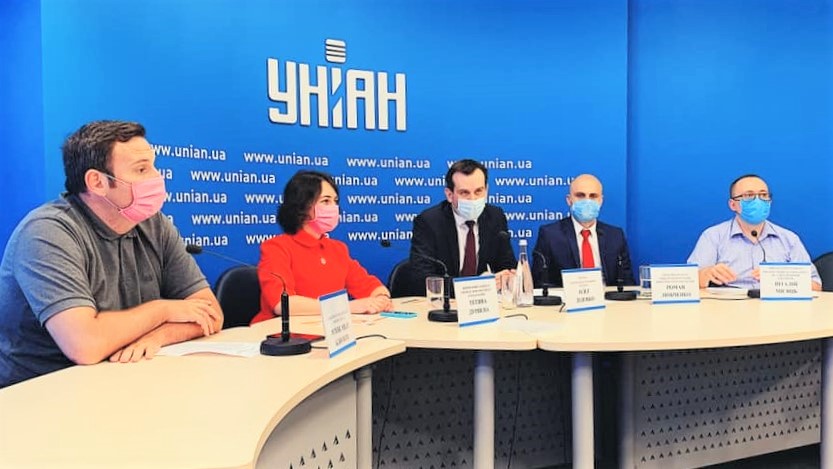Press-conference "Millions of voters now can vote in local elections", held in the UNIAN press-center on 24 June 2020, covered the following: peculiarities of the election process this year, consequences of the legislative amendments, and the need to promptly inform the part of society subject to these amendments.
Head of the Central Election Commission Oleh Didenko noted that the Central Election Commission consistently takes measures to ensure voting rights of Ukrainian citizens regardless of their registration address: "In fact, we have already moved from the need to vote at a formal residence registration address to a possibility of determining the election address at an actual place of residence. This is especially important in local elections. The corresponding procedures will give citizens an opportunity to elect local authorities in communities they actually live.”
As for the next step towards the liberalization of changing and determining of an electoral address, it may be the Draft Law #3485 introducing amendments to the Law of Ukraine on the State Register of Voters, which was adopted by the Verkhovna Rada of Ukraine in the first reading on June 4 this year. If it's approved, voters will not be required to provide a documented proof of their current place of residence. Oleh Didenko also emphasized: "There are also precautions agains misuses: applications for a change (determination) of an election address can be submitted in the inter-election period and only in the first five days of the election process. Besides that, a re-application is possible not earlier than 180 days, while local elections last 50 days."
According to Oleksandr Kliuzhev, Analyst at the Civil Network OPORA, abuses in Ukrainian elections are still possible, and therefore law enforcement agencies must be ready to counteract possible manipulations with new procedures for changing an election address. The state has finally abandoned the approach “no right for a citizen- no problem,” but this achievement must be backed by guarantees of the certainty of punishment for electoral crimes. "To reach this goal, OPORA, together with law enforcement agencies, has prepared improvements to the Criminal Code and the Code of Administrative Offenses, which the Parliament is obliged to finally adopt. Like any other election procedure, this should give voters an opportunity to vote, and fairly punish dishonest candidates or bribed voters. ” - he emphasized.
Executive Director of the HRUPA VPLYVU Civil Holding Tetiana Durnieva said that it took 15 years to fight for the protection of political rights of internally displaced persons, as well as for the voting rights of unregistered voters and citizens who do not live at registration address: "Finally, about 5 million citizens (1.2 million IDPs, 1 million unregistered voters and approximately 3.3 million mobile citizens within the country) will be able to elect local governments and influence the development of their communities regardless of their registration address. We welcome the liberalization of procedures, stepping away from Soviet link to "registration", and the opportunity to apply for a change or determination of an election address online or through an authorized person. The Parliament and the Central Election Commission have made every effort to ensure that citizens have a clear and accessible procedure for inclusion in voter lists at their place of residence. Now it is important to use this opportunity and timely submit an application to the State Voter Register maintenance body - from July 1 to September 9. "
Executive Director of the All-Ukrainian Legal Aid Coalition Charitable Organization Vitalii Misiats believes that the upcoming local elections will face a big challenge given a big part of IDPs are elderly and disadvantaged people. Most of them may miss this election due to a simple ignorance of their rights. Young and active, for their part,- because their opinion was not taken into account for a long time. There is a hazard that 1,200,000 IDPs (almost 4% of Ukrainian voters) will not vote in the elections. "It is especially important now to consolidate the efforts of government officials and the public sector to conduct an awareness campaign. Involving the civil society to the explanation of new election rules, and urging IDPs to participate in the voting, and assisting IDP candidates will help them exercise their right to vote and to stand for election in local elections.” - added Vitalii Misiats.
Program Director of the International Foundation for Electoral Systems in Ukraine Roman Liubchenko, says that IFES Ukraine systematically supports democratic electoral processes in Ukraine: "We welcome the Central Election Commission's inclusive approach in drafting regulations allowing to determine and change an election address. Involvement of NGO representatives in the decision-making process helps to take into account the needs of different target audiences and increases the level of public confidence in the CEC. Despite the quarantine restrictions, CEC members held a public discussion of proposals to the draft Resolution on the Change of Election Address Online, which allowed to take into account most of the recommendations.
We would like to remind that the Central Election Commission has approved on May 18 the Procedure for Consideration of Voter Application for a Change of Election Address, what will allow IDPs and other internally mobile citizens to determine election address by the place of residence and vote in any type of elections.
On June 11, the CEC approved the Procedure for Determination of Election Address for Voters not having a Registration Address. This allows citizens that were deprived of their voting rights because they don’t have a registration address, to participate in elections. Both resolutions were adopted in accordance with the Election Code and enter into force on July 1, 2020.
The event was organized by the “HRUPA VPLYVU” Civil Holding, supported by the International Foundation for Electoral Systems (IFES), the United States Agency for International Development (USAID), the Ministry of International Affairs of Canada and British assistance from the British Government in partnership with the All-Ukrainian Legal Aid Coalition Charitable Organization and the Civil Network OPOR
